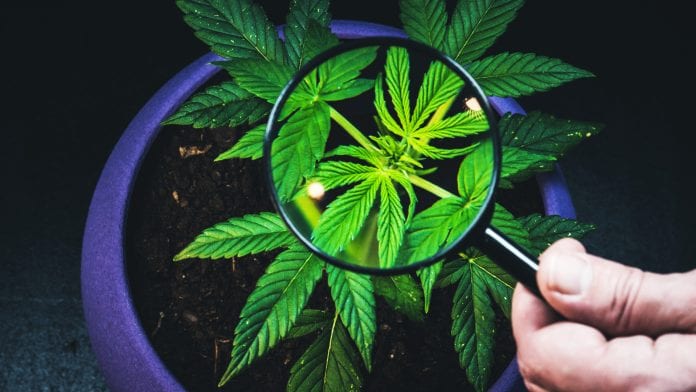You are here
Home 🌿 Cannabis Technology News 🌿 Clinical trials anticipated for treating pancreatic cancer with cannabis 🌿Clinical trials anticipated for treating pancreatic cancer with cannabis

A flavonoid of cannabis – FBL-03G – has been granted Orphan drug status by the United States Food and Drug Administration.
It is anticipated this will now lead to clinical trials with humans for treating pancreatic cancer with cannabis within the next few months.
Flavocure, a drug discovery and development company, was granted Orphan drug status to its lead drug candidate, the cannabis flavonoid Caflanone (FBL-03G), by the United States Food and Drug Administration (FDA), following the successful demonstration of its therapeutic efficacy in tumour progression in animals with pancreatic cancer.
Treating pancreatic cancer with cannabis
Dr Henry Lowe, Executive Chairman of Flavocure, said: “We are very pleased to have received Orphan Drug designation from the FDA for Caflanone. This is a significant milestone that underscores Flavocure’s successful innovations and drug development programme.
“Our Investigational New Drug (“IND”) enabling studies have reaffirmed outstanding results and we anticipate commencing with clinical trials in humans in the coming months to address pancreatic cancer.
“The world requires and demands a new standard of care that is both effective and novel for the treatment of this disease. As a recognised leader in this field of drug discovery, we are poised to bring this new standard of care to the world.”
Dr Ngeh Toyang, CEO, said: “Despite fewer than 200,000 people per year being diagnosed with the disease, pancreatic cancer is the third most common cause of death among cancer patients in the United States.
“We are also motivated by feedback and inquiries from around the world arising from the publication of results from our joint Flavocure and Harvard Medical School pre-clinical studies in the Frontiers in Oncology Journal“.
Flavonoid FBL-03G
Caflanone – FBL-03G – has been derived from an endemic strain of Cannabis Sativa found in Jamaica.
Professor Lowe, Adjunct Professor, University of Maryland Medical School and University of the West Indies Medical School, discovered this rare form of flavonoid rich phytomedical material.
The Flavocure research team developed a proprietary synthesis of the bioactive material, which is now available in commercial quantities for use in human clinical studies. The drug delivery payload has been designed to utilise a nano-drone delivery technology developed by Harvard Medical School for which protocol has been approved by the FDA.
The drug, in pre-clinical studies conducted at Harvard Medical School, exhibited powerful results in difficult to treat animal models of pancreatic cancer contributing to clinical optimism in the medical and research community; and, a high level of interest from the patient community.
Orphan Drug Designation
The Orphan designation was passed into law by President Ronald Reagan, as the Orphan Drug Act of 1983, to encourage the development of drugs which may provide significant benefit to patients suffering from rare diseases.
The designation by the FDA is granted to promote the development of drugs that target conditions affecting 200,000 or fewer US patients annually and that are expected to provide significant therapeutic advantage over existing treatments.
Orphan designation qualifies a company for benefits that apply across all stages of drug development, including an accelerated approval process, seven years of market exclusivity following marketing approval, tax credits on US clinical trials, eligibility for orphan drug grants, and a waiver of certain administrative fees.
420 Intel is Your Source for Marijuana News
420 Intel Canada is your leading news source for the Canadian cannabis industry. Get the latest updates on Canadian cannabis stocks and developments on how Canada continues to be a major player in the worldwide recreational and medical cannabis industry.
420 Intel Canada is the Canadian Industry news outlet that will keep you updated on how these Canadian developments in recreational and medical marijuana will impact the country and the world. Our commitment is to bring you the most important cannabis news stories from across Canada every day of the week.
Marijuana industry news is a constant endeavor with new developments each day. For marijuana news across the True North, 420 Intel Canada promises to bring you quality, Canadian, cannabis industry news.
You can get 420 Intel news delivered directly to your inbox by signing up for our daily marijuana news, ensuring you’re always kept up to date on the ever-changing cannabis industry. To stay even better informed about marijuana legalization news follow us on Twitter, Facebook and LinkedIn.




